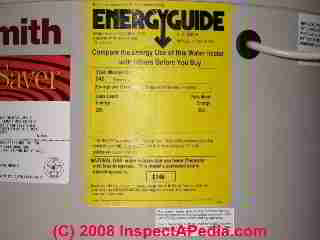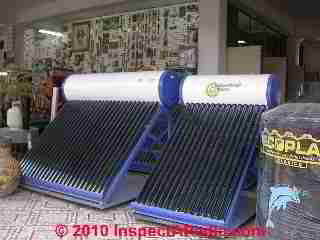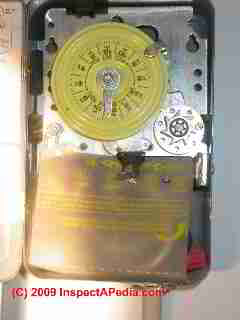 Water Heater Efficiency
Ratings, Measurements, Improvements
Water Heater Efficiency
Ratings, Measurements, Improvements
- POST a QUESTION or COMMENT about the efficiency ratings of different water heating methods & how to improve water heating efficiency or reduce hot water heating costs
Water heater energy efficiency comparisons: this article describes and compares the energy efficiency or operating costs of different types of water heater systems.
We list methods for improving water heater efficiency and hot water usage, the efficiency of how we use hot water, and how to reduce the contribution of hot water heating cost to the total building energy bill.
InspectAPedia tolerates no conflicts of interest. We have no relationship with advertisers, products, or services discussed at this website.
- Daniel Friedman, Publisher/Editor/Author - See WHO ARE WE?
Hot Water Heater Efficiency Ratings, Factors, Improvements
Article Contents
- WATER HEATER EFFICIENCY - Hot Water Heater Efficiency Ratings, Factors, Improvements
- Table comparing efficiency of different methods of producing domestic hot water
- Hot Water usage & energy efficiency improvement recommendations that you can add, or change in your system can cut hot water heating bills significantly
A Quick Comparison of Water Heater Types by Efficiency
By 2010, according to the American Council for an Energy-Efficient Economy, water heater efficiencies could be organized and described by an energy efficiency factor. Water heater types are listed below in order of overall energy efficiency as follows:
Table of Water Heater Energy Efficiency Ratings |
||
| Energy source - fuel | Type of water heater | Energy Efficiency Rating - EF |
| Oil, No.2 home heating oil | Conventional oil fired water heater | 0.55 |
| Gas, LP or Natural | Conventional gas fired water heater | 0.60 |
| Gas, LP or Natural | High efficiency gas fired water heater | 0.65 |
| Gas, LP or Natural | Pilotless gas fired water heater | 0.80 |
| Gas, LP or Natural | Condensing gas storage type water heater | 0.86 |
| Electricity | Minimum-efficiency electric storage type water heater | 0.90 |
| Electricity | HIgh efficiency electric storage type water heater | 0.95 |
| Solar | Solar water heater, electric backup | 1.20 |
| Electricity | Electric heat pump water heater | 2.20 |
Notes to the table above
 1. The energy efficiency ratings do not reflect water heater recovery times.
1. The energy efficiency ratings do not reflect water heater recovery times.
For example, an electric storage tank type water heater will generally have a slower recovery time than a gas fired or oil fired heater of similar size.
See WATER HEATER COMPARISONS, PROPERTIES for a description of water heater life expectancy, recovery rates, costs and operating costs, and a comparison of other water heater types and properties.
Data sources [1] [2] [3] [4]
3. As we explain below, the local efficiency of a water heater may look great, but the true energy efficiency of a water heater depends on more broad considerations.
For example, electric resistance heating is only as clean and efficient as the fuel (often coal) used at the electrical company's power plant. The cost, efficiency, and environmental impact of the fuel used at the electrical generating plant that powers your electric heater varies widely by geographic area.
4. Also see ENERGY STAR PROGRAM
But, currently (2012) unless your electric utility company is offering preferential electricity rates (such as off-peak energy use or an "all electric home" discount), even though modern electric water heaters have a higher efficiency factor than oil or gas fired water heaters, don't assume that an electric water heater is the most sound environmental choice.
These energy efficiency factor ratings do not include variations in life expectancy of the water heater, but ACEEE rated all of the water heaters at an expected 13-year life except oil-fired that they rated at 8 years.
The shorter life of the oil fired equipment, combined with its lower EF (if these are accurate estimates) mean that the per-year operating cost of oil fired water heating equipment is more than its competitors.
These ratings also do not compare BTUH input rates of the different equipment and thus don't say anything about the hot water recovery rate.
Also, the purchase and install costs of these different types of water heating systems vary widely, from a low of $820. for a typical high-efficiency electric storage type (tank) water heater, to $4,800. for a solar water heater with electric backup.
Costs do not include installation labor nor the effect of financial incentives, to this cost for solar hot water is over-stated.
Hot Water Usage Efficiency Improvements You Can Make
 Often efficiency improvements in hot water use (or production) include include recommendations for installing restrictions on the flow rate of hot water in a building (flow restrictors or restrictors combined with an anti-scald valve), either right at the fixtures, or at the water heating device.
Often efficiency improvements in hot water use (or production) include include recommendations for installing restrictions on the flow rate of hot water in a building (flow restrictors or restrictors combined with an anti-scald valve), either right at the fixtures, or at the water heating device.
You are trading off total flow rate for reduced water heating costs.
- Alternative ways to make hot water:
consider replacing or adding a hot water production alternative that is more energy efficient.
At ALTERNATIVE HOT WATER SOURCES we describe alternative methods for making hot water.
In addition to the obvious improvement of updating to a more fuel efficient model water heater, options such as pre-storage tanks or cascaded water heaters can make a very significant reduction in the cost of heating hot water, especially for buildings where the hot water quantity usage is large. - Appliances:
Change home appliances to install devices that consume less hot water. For example, see our hot water usage example below. - Electric water heaters:
install a water heater timer so that you are not paying to keep water hot when there is no call for hot water. Details are
at TIMERS for ELECTRIC WATER HEATERS
But also see the limitations on water heater timers discussed at
WATER HEATER STANDBY LOSSES - Hot water usage:
when replacing a clothes washer, install models that use less water by installing a high efficiency washing machine with a "low water factor" and always wash full loads rather than smaller loads in your washing machine - Plumbing fixtures:
Change plumbing fixtures (low flush toilets, restricted flow shower heads and faucets) to install devices that consume less hot water. For example, replace showerheads that have a flow rate greater than 2.5 gallons per minute (the current National Energy Policy Act standard), with low flow shower heads.
Watch out: for increased hot water scalding burn risk hazards where low-flow shower heads are installed in homes without an anti-scald device.
See MIXING / ANTI-SCALD VALVE - Shower usage:
How to take an efficient but nice and hot shower: especially for older fixtures that do not make use of a reduced-flow shower head, take shorter showers, and better still, use your shower more intelligently. Our daughter Mara used to start a shower by turning the hot water all the way on, to its fastest flow rate, then tempering the hot by turning on enough cold to avoid getting burned.
This gives a wonderful power, fast, huge water flow out of the shower head. But if you instead turn the hot water, say just half way on, or fully on until water is hot, then backing it off to half-speed, you will need less cold mixed-in to make the shower comfortable, and you'll suck hot water out of your water heater at half the rate.
- ANTI_SCALD VALVES & HOT WATER QUANTITY - improve safety and meter hot water more slowly - makes it last longer
- CLOGGED PIPING & Hot Water Flow - diagnose and correct poor hot water pressure and flow due to pipe clogging
- EXTRA TANKS to INCREASE HOT WATER - pre-heat your hot water absorbing ambient building heat or increase hot water quantity with cascaded, staged, multiple water heaters, possibly using more than one energy source
- HIGH EFFICIENCY WATER HEATERS - if replacing a water heater, consider a model that saves money in operating cost
- INSULATE HOT WATER PIPING - worth doing where piping is accessible, especially on piping running through cool areas
- INSULATE HOT WATER TANK? - probably not worth doing except in special cases; important safety warnings
- LARGER DIAMETER WATER SUPPLY PIPING - worth doing if replacing clogged pipes or building new construction
- STANDBY LOSSES IN WATER HEATERS - steps to reduce energy waste
- TANKLESS COIL HOT WATER INCREASE - various tricks can significantly improve the safety and water quantity available
- Hot water usage efficiency improvements:
- change home appliances and plumbing fixtures to install devices that consume less hot water. For example, replace showerheads that have a flow rate greater than 2.5 gallons per minute (the current National Energy Policy Act standard),
- take shorter showers,
- when replacing a clothes washer, install models that use less water by installing a high efficiency washing machine with a "low water factor" and always wash full loads rather than smaller loads in your washing machine.
- Install an active or passive pre-heater tank for domestic hot water supply
References
- Also see additional citations atReferences or Citations at the end of this page
- ENERGY EFFICIENT WATER HEATING [PDF] U.S. Department of Energy, a PDF file that provides tips on lowering your water heating bil
...
Continue reading at GAS WATER HEATERS, HIGH EFFICIENCY or select a topic from the closely-related articles below, or see the complete ARTICLE INDEX.
Or see these
Recommended Articles
Suggested citation for this web page
WATER HEATER EFFICIENCY at InspectApedia.com - online encyclopedia of building & environmental inspection, testing, diagnosis, repair, & problem prevention advice.
Or see this
INDEX to RELATED ARTICLES: ARTICLE INDEX to WATER HEATERS
Or use the SEARCH BOX found below to Ask a Question or Search InspectApedia
Ask a Question or Search InspectApedia
Try the search box just below, or if you prefer, post a question or comment in the Comments box below and we will respond promptly.
Search the InspectApedia website
Note: appearance of your Comment below may be delayed: if your comment contains an image, photograph, web link, or text that looks to the software as if it might be a web link, your posting will appear after it has been approved by a moderator. Apologies for the delay.
Only one image can be added per comment but you can post as many comments, and therefore images, as you like.
You will not receive a notification when a response to your question has been posted.
Please bookmark this page to make it easy for you to check back for our response.
IF above you see "Comment Form is loading comments..." then COMMENT BOX - countable.ca / bawkbox.com IS NOT WORKING.
In any case you are welcome to send an email directly to us at InspectApedia.com at editor@inspectApedia.com
We'll reply to you directly. Please help us help you by noting, in your email, the URL of the InspectApedia page where you wanted to comment.
Citations & References
In addition to any citations in the article above, a full list is available on request.
- [1] American Council for an Energy Efficient Economy, American Council for an Energy-Efficient Economy,
529 14th Street N.W., Suite 600,
Washington, D.C. 20045-1000, (202) 507-4000
E-mail: aceeeinfo@aceee.org
E-mail: ACEEE_Publications@aceee.org - www.aceee.org/ - original source for comments in this article|:: http://www.aceee.org/Consumerguide/waterheating.htm - [2] GAMA data base of water heater efficiencies: http://www.gamapower.org/water.php
- [3] Energy Efficient Water Heating, US Department of Energy, provides tips on lowering your water heating bill
- [4] Carson Dunlop provides home inspection education including the ASHI-adopted a Home Inspection Home Study Course, and publications such as the Home Reference Book, the Home Reference eBook, and report writing materials including the Horizon report writer, and home inspection services. Alan Carson is a past president of ASHI, the American Society of Home Inspectors.
- Carson Dunlop, Associates, Toronto, have provided us with (and we recommend) Carson Dunlop Weldon & Associates'Technical Reference Guide to manufacturer's model and serial number information for heating and cooling equipment
Special Offer: Carson Dunlop Associates offers InspectAPedia readers in the U.S.A. a 5% discount on any number of copies of the Technical Reference Guide purchased as a single order. Just enter INSPECTATRG in the order payment page "Promo/Redemption" space. - In addition to citations & references found in this article, see the research citations given at the end of the related articles found at our suggested
CONTINUE READING or RECOMMENDED ARTICLES.
- Carson, Dunlop & Associates Ltd., 120 Carlton Street Suite 407, Toronto ON M5A 4K2. Tel: (416) 964-9415 1-800-268-7070 Email: info@carsondunlop.com. Alan Carson is a past president of ASHI, the American Society of Home Inspectors.
Thanks to Alan Carson and Bob Dunlop, for permission for InspectAPedia to use text excerpts from The HOME REFERENCE BOOK - the Encyclopedia of Homes and to use illustrations from The ILLUSTRATED HOME .
Carson Dunlop Associates provides extensive home inspection education and report writing material. In gratitude we provide links to tsome Carson Dunlop Associates products and services.

